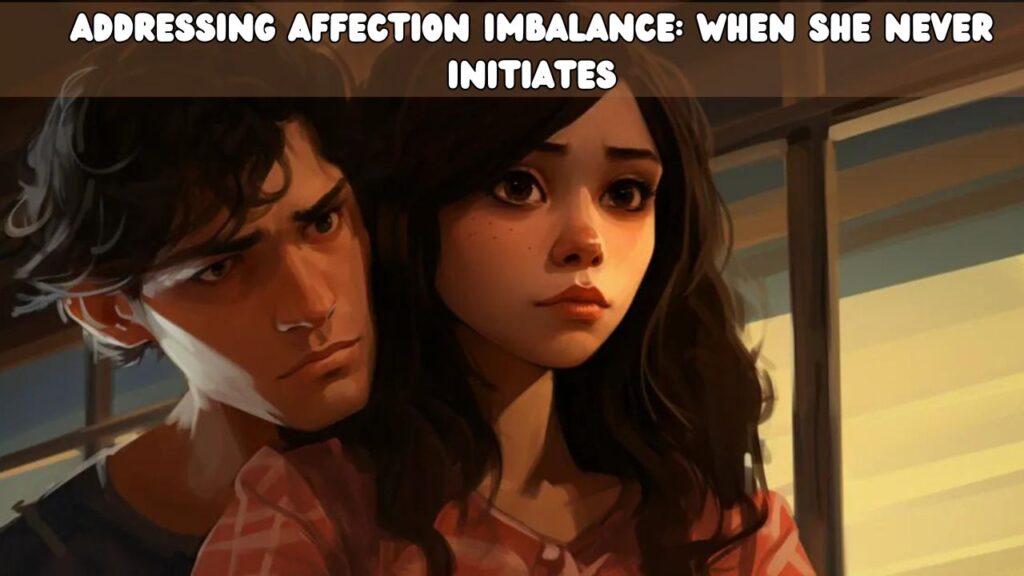Message to Dr. Hart
From: Leo
Age: 34
Partner: 32
Duration: 2 years
From: United States
Hello Dr. Hart,
I’m Leo, 34, from the United States. My girlfriend, who is 32, and I have been together for two years. I’ve noticed that she rarely, if ever, initiates affection, which leaves me feeling a bit unwanted. Is there a way I can understand and address this without causing conflict? Any advice would be greatly appreciated.
Dr. Seraphina Hart’s Response:
Dear Leo,
Understanding your concern about your girlfriend not initiating affection is crucial in navigating this aspect of your relationship. Feeling uncertain or experiencing a sense of emotional disconnect due to this can be challenging. It’s commendable that you’re seeking to address this matter constructively, and doing so with empathy and understanding is key. There could be numerous reasons behind her behavior, and exploring these will help in finding a way forward.
Understanding the Lack of Affection Initiation

When it comes to affection in relationships, there isn’t a one-size-fits-all approach. Each individual expresses and receives love differently, and understanding these differences is crucial for a healthy relationship.
Different Love Languages
- Exploring Love Languages: The concept of love languages, as proposed by Dr. Gary Chapman, suggests that people express and experience love in different ways. These include words of affirmation, acts of service, receiving gifts, quality time, and physical touch. Your girlfriend might be expressing her affection in ways that are less obvious than physical touch or initiating affection.
- Identifying Her Love Language: Pay attention to how she expresses love. Does she do things for you, spend quality time, give thoughtful gifts, or use words to express her feelings? Understanding her primary love language can help you feel more connected and appreciated in the relationship.
- Expressing Your Own Needs: It’s also important to communicate your own love language to her. If physical touch and affection initiation are important to you, expressing this need gently can help her understand your perspective.
Past Experiences and Upbringing
- Influence of Past Experiences: An individual’s comfort level with initiating affection can be significantly influenced by their past experiences. This could include previous romantic relationships, family dynamics during upbringing, or even cultural norms.
- Understanding Her Background: If she grew up in an environment where physical affection was not commonly expressed, she might find it less natural to initiate such gestures. This doesn’t mean she doesn’t feel affection towards you; it might simply be a matter of different expressions of love.
- Creating a Safe Space: Encourage a safe and open environment where both of you can discuss your past experiences and how they impact your relationship behaviors. Understanding each other’s backgrounds can foster empathy and patience.
Leo, by exploring these aspects and communicating openly, you can gain a deeper understanding of your girlfriend’s behavior and find ways to bridge the affection gap in your relationship. Remember, it’s about building mutual understanding and adapting to each other’s love languages and comfort levels.
Communicating About Affection Needs

Effective communication is the cornerstone of any healthy relationship, particularly when it comes to navigating differences in affection needs. In your situation with your girlfriend, Leo, it’s important to have an open and honest dialogue about how you both perceive and express affection.
Open and Non-Confrontational Conversation
Having a conversation about affection needs can be delicate, but it’s essential for mutual understanding and fulfillment in the relationship.
- Choosing the Right Environment: Select a setting that is comfortable and private for both of you, free from distractions or stressors. This might be during a quiet evening at home or a time when you both feel relaxed and open to discussion.
- Using “I” Statements: Approach the conversation from your perspective to avoid making her feel defensive. Using “I” statements allows you to express how you feel without implying blame. For instance, say, “I feel most connected and loved when affection is reciprocated, and I’ve noticed that I tend to be the one who initiates it. I’m curious to know how you feel about initiating affection?”
- Expressing Your Needs Clearly: Be clear about what affection means to you and why it’s important. Explain how her initiating affection impacts your feelings of closeness and connectedness in the relationship.
- Inviting Openness: Encourage her to share her own feelings and perspective. Make it clear that you are open to understanding her view and that the conversation is a safe space for honesty.
Understanding Her Perspective
Creating an environment where your girlfriend feels comfortable expressing her thoughts and feelings is vital for a constructive conversation.
- Listening Actively: When she shares her perspective, listen actively. This means giving her your full attention, acknowledging her feelings, and responding thoughtfully.
- Acknowledging Potential Factors: Be open to the fact that there may be underlying reasons for her behavior. This could include stress, emotional challenges, personal history, or even a simple difference in how she expresses affection.
- Respecting Differences: Understand that people express love in different ways. If her primary love language is different from yours, discuss ways you can both express affection in a manner that feels fulfilling for each of you.
- Seeking Mutual Understanding: The goal of the conversation should be to reach a mutual understanding and find a balance that satisfies both of your emotional needs. It’s about adapting to each other’s styles and finding a middle ground.
Leo, by approaching the conversation with empathy, openness, and a desire to understand each other better, you can navigate this aspect of your relationship more effectively. Remember, it’s about creating a partnership where both of you feel loved, valued, and connected.
Building a More Affectionate Relationship

Building a more affectionate relationship, especially when one partner tends to be less demonstrative, involves patience, understanding, and sometimes a bit of creativity. Here are some strategies to help foster a more affectionate bond between you and your girlfriend.
Creating Opportunities for Affection
Creating environments and situations that naturally foster affection can be a subtle yet effective way to enhance the physical connection in your relationship.
- Planning Intimate Activities: Consider activities that encourage closeness, like watching a movie together on the couch, cooking a meal together, or stargazing. These activities can create an atmosphere conducive to affection.
- Initiating Casual Touch: Small acts of touch, like holding hands while walking, a gentle touch on the back, or a warm embrace when saying hello or goodbye, can build a habit of physical connection.
- Leading by Example: Demonstrating affection can sometimes encourage your partner to reciprocate. This doesn’t mean overwhelming her with gestures but rather showing affection in a way that is natural and comfortable for you.
- Creating a Relaxing Environment: Sometimes, the lack of affection can be due to stress or feeling overwhelmed. Creating a relaxing environment at home can help alleviate this and make space for more affectionate interactions.
Encouraging Small Gestures
Encouraging and acknowledging smaller gestures of affection can be a stepping stone to building more overt expressions of love and affection in your relationship.
- Recognizing Subtle Affections: Pay attention to the small things she does that may be her way of showing affection. This could be a text to check on you, making your favorite meal, or a thoughtful gesture. Recognizing and appreciating these can foster a culture of affection.
- Positive Reinforcement: When she does initiate any form of affection, acknowledge it positively. Express how much you appreciate her effort and how it makes you feel. Positive reinforcement can encourage her to continue and increase these behaviors.
- Suggesting Easy Gestures: Sometimes, a partner may not initiate affection because they’re unsure of what to do. You can suggest easy gestures like a good morning kiss, a hug after work, or holding hands while out and about.
- Respect Comfort Levels: It’s important to respect her comfort levels and not push too hard for physical affection, as this can lead to the opposite of the desired effect. Let her know that any gesture of affection, no matter how small, means a lot to you.
Leo, remember that building a more affectionate relationship is a journey that involves both partners’ efforts and understanding. It’s about finding what works best for both of you, respecting each other’s comfort levels, and appreciating the efforts, big or small, in fostering a closer emotional connection.
Considering Professional Guidance
Navigating relationship dynamics can sometimes be complex and challenging, especially when it involves addressing issues of affection and emotional connection. While your efforts in understanding and communicating are vital, there are instances where seeking professional guidance can provide additional support and tools necessary for fostering a healthier relationship.
Identifying the Need for Professional Help

It’s important to recognize when it’s time to seek external help in addressing issues in your relationship.
- Persistent Communication Challenges: If you’ve attempted to discuss the issue of affection with your girlfriend and haven’t seen progress, or if these conversations lead to misunderstandings or conflict, a therapist can facilitate healthier communication.
- Deep-Rooted Issues: Sometimes, the lack of affection could be tied to deeper emotional issues or past experiences. A professional can help unravel these complex layers in a safe and structured environment.
- Impact on the Relationship: If the situation is significantly impacting your relationship’s happiness and stability, and if you find yourself constantly feeling unloved or rejected, these are strong indicators that professional guidance could be beneficial.
How Therapy Can Help
Understanding how relationship therapy can aid your situation is crucial in making the decision to seek help.
- Improving Communication: A therapist can offer tools and techniques to improve the way you and your girlfriend communicate, ensuring that both of your needs and concerns are expressed and understood effectively.
- Addressing Individual Needs: Therapy can help each of you understand and articulate your own needs in the relationship. It’s not uncommon for individuals to struggle with identifying or expressing what they need from their partner.
- Developing Strategies: A relationship therapist can work with you to develop strategies to enhance emotional intimacy and affection. This might include exercises to do together or individually, communication techniques, or addressing personal barriers to affection.
- Neutral Ground: Having a neutral third party can make it easier to discuss sensitive topics. A therapist provides a safe, unbiased space where both partners can feel heard and understood.
Leo, it’s commendable that you’re proactively seeking to understand and address this aspect of your relationship. Remember, seeking professional help is a sign of strength and commitment to improving your relationship. Change takes time, and navigating this journey with patience, empathy, and open communication – and sometimes with the help of a professional – is key to developing a deeper, more fulfilling bond.
Warm regards,
Dr. Seraphina Hart, PhD
Dr. Seraphina Hart, PhD, is a relationship therapist with over two decades of experience in the field of psychology and human behavior. With a rich academic background from Stanford University, she has an in-depth understanding of the complexities of interpersonal relationships. Dr. Hart's journey began with a deep fascination with the human mind and how it forms emotional connections, leading her to specialize in relationship therapy.
Her compassionate approach and unique methodology are informed by her extensive study of various therapeutic modalities, including Cognitive Behavioral Therapy (CBT), Emotionally Focused Therapy (EFT), and mindfulness techniques. Dr. Hart believes in the power of empathy and understanding in healing and transforming relationships. With her guidance, clients learn to navigate their emotions, communicate effectively, and foster a deep sense of self-awareness.



You may like
Should I Marry Someone with Debt? Navigating Love, Money, and Future Together
Dealing with an Overbearing Mother-in-Law: How to Set Boundaries Without Harming Your Marriage
How to Apologize Effectively in a Relationship: 7 Steps to Show You Truly Care